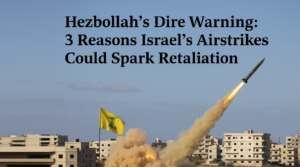Hezbollah’s Dire Warning: 3 Reasons Israel’s Airstrikes Could Spark Retaliation
Hezbollah’s deputy leader, Naim Kassem, has warned that the group may retaliate if Israeli airstrikes on Lebanon continue and the Lebanese government fails to intervene. His statement follows Israel’s recent strike on Beirut, the first since a ceasefire ended a war between the two sides in November. The attack came after rockets were fired from Lebanon toward Israel, though Hezbollah denied responsibility. Under the U.S.-brokered ceasefire, Israel was supposed to withdraw from Lebanese territory by January, while Hezbollah was required to move its forces north of the Litani River.
However, Israel has continued its strikes, claiming to target Hezbollah positions, while Hezbollah insists it has upheld its side of the agreement. Kassem accused Israel of using military pressure to push Lebanon toward normalizing relations, something Hezbollah strongly opposes. He warned that if diplomacy fails, the group will not hesitate to take action to defend itself. With tensions rising and the ceasefire under strain, the region risks being pulled back into conflict.

Hezbollah’s Dire Warning: 3 Reasons Israel’s Airstrikes Could Spark Retaliation
Naim Kassem, the deputy leader of the Lebanese militant group Hezbollah, issued a sharp warning on Saturday, stating that continued Israeli airstrikes on Lebanon could compel the group to retaliate if the Lebanese government does not take action to halt the attacks. His comments followed an Israeli airstrike on Beirut, the first such incident since a ceasefire ended hostilities between Hezbollah and Israel in November. The strike occurred just hours after two rockets were fired from Lebanon into Israel, though Hezbollah denied responsibility for the launch.
Escalating Tensions at the Border
The recent violence has reignited fears of a broader conflict along the Lebanon-Israel border. A U.S.-brokered ceasefire agreement, which paused months of fighting in November, required Israel to withdraw from Lebanese territory by January 2024 and Hezbollah to relocate its forces north of the Litani River, roughly 30 kilometers from the border. However, Israel has continued conducting airstrikes, claiming they target Hezbollah military sites. Hezbollah, meanwhile, insists it has upheld its end of the agreement by withdrawing fighters and equipment.
The situation has grown increasingly volatile. Over the past week alone, Israeli strikes have killed nine people in Lebanon, including civilians such as women and children. Kassem accused Israel of deliberately escalating tensions to pressure Lebanon into normalizing diplomatic relations—a prospect Hezbollah vehemently opposes. The group, which holds significant political influence in Lebanon, views normalization with Israel as a betrayal of Palestinian rights and a threat to regional resistance movements.
Hezbollah’s Ultimatum
Kassem emphasized that while Hezbollah remains committed to the ceasefire, the group reserves the right to defend itself if diplomatic efforts fail. “We will not allow anyone to prevent us from protecting our people and our land,” he declared, signaling readiness to resume military action. His statement underscores the fragile nature of the truce, which has been tested repeatedly since October 2023, when Hamas’s surprise attack on Israel triggered a devastating war in Gaza.
The conflict between Hezbollah and Israel intensified in September 2024, with both sides exchanging heavy airstrikes and artillery fire. Months of fighting displaced thousands of civilians and left widespread destruction in border communities. While the November ceasefire brought temporary calm, sporadic clashes and accusations of violations have persisted, keeping the region on edge.
Roots of the Conflict
Hezbollah, an Iran-backed Shiite group, has long positioned itself as a key opponent of Israeli policies in the region. The group’s clashes with Israel date back decades, including a month-long war in 2006. The current cycle of violence, however, is closely tied to the Gaza conflict. Hezbollah leaders have framed their actions as solidarity with Hamas and Palestinian civilians, though critics argue the group is exploiting the crisis to strengthen its political standing in Lebanon.
Israel, for its part, views Hezbollah as one of its most immediate threats, citing the group’s growing arsenal of rockets and drones. Israeli officials have repeatedly stated that their strikes in Lebanon aim to disrupt Hezbollah’s military capabilities and prevent cross-border attacks.
Human Cost and Regional Implications
The recent casualties in Lebanon have drawn condemnation from humanitarian organizations, which warn that civilian deaths risk inflaming public anger and undermining peace efforts. Local reports detail families displaced by the strikes and communities struggling to rebuild amid the uncertainty. Meanwhile, regional powers, including Iran and Saudi Arabia, are closely monitoring the situation, with fears that a wider war could destabilize the Middle East.
The U.S., which helped negotiate the November ceasefire, has called for restraint on both sides. However, Washington’s unwavering support for Israel and its designation of Hezbollah as a terrorist organization complicate its role as a neutral mediator.
A Precarious Path Forward
As tensions mount, the Lebanese government faces increasing pressure to address the crisis. Prime Minister Najib Mikati’s administration, already grappling with economic collapse and political deadlock, has yet to issue a formal response to Kassem’s warnings. Analysts suggest that Hezbollah’s threat to act independently reflects dwindling faith in state institutions to protect national interests.
For now, the ceasefire hangs by a thread. Both sides appear locked in a cycle of retaliation, with civilians bearing the brunt of the violence. Kassem’s warning serves as a stark reminder that without urgent diplomatic intervention, the region risks plunging into another devastating war.
The international community, including the United Nations, has urged renewed dialogue to uphold the ceasefire terms. However, with trust between the parties eroded and regional alliances deepening divisions, the path to lasting peace remains uncertain. Hezbollah’s message is clear: if the strikes continue, the group will respond forcefully—a scenario that could drag Lebanon and the broader Middle East into renewed chaos.
You must be logged in to post a comment.